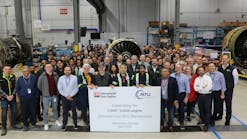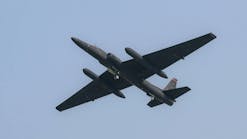Fixed Base Operators offer a look inside the day-to-day business of customer service on the general aviation side of the airport ramp, reports Michelle Garetson.
October 2003
What is an FBO? Depends on who you ask, but the acronym can stand for Fixed Base Operator and Fixed Base Operations. Definitions for FBO range from the FAA's version: FBO (Fixed Base Operator): An airport-based business which parks, services, fuels, and may repair aircraft; often rents aircraft and provides flight training. The term was coined to differentiate FBO; from business or individuals without an established place of business on the airport; to an aviation insurance company's definition: Fixed Base Operations: FBO operations are diverse in scope and range from providing corporate aircraft services such as fueling, maintenance and hangaring to Part 135 charter operations and aircraft management services to providing flight instruction and a host of other services to the aviation community; to simply, FBO - Fixed-Base Operator: The aircraft equivalent of a full-service gas station.
The number of FBOs also vary depending on who you ask, but the estimated number in the U.S. falls somewhere between 2,500 to 4,000. However defined, one thing rings true - FBOs in any shape or form have to be prepared for all types of customers.
View From The Ground
Larry Jorash is Area General Manager for Signature Flight Support locations at Bradley International (BDL) in Windsor Locks, CT;, Laurence G. Hanscom Field Airport in Bedford, MA; Logan International Airport (BOS), in Boston, MA; and Westchester County Airport (HPN) in White Plains, NY. He is an area general manager, but is directly the general manager for BDL and BOS and then has oversight responsibilities for BED and HPN. He spends most of his time at BOS.
Ed Malec has been General Manager for the last five years for TACAir, a division of Truman Arnold Companies, at BDL, but started there in 1977 with the Air Kaman FBO as a GSE mechanic and did that for 10 years. "We handled both commercial and GA - Aviation refuelers, deicers, heating/AC vehicles, GPUs, etc." says Malec. "I even implemented a rebuilding shop for all of our nozzles and ground reels and internal tank valves-that a lot of FBOs ship off to have vendors repair/refurbish - was doing it in-house."
Malec recalls each change of regime over the years at BDL. "Air Kaman was the FBO, that was bought out by Combs Gates. Then, a brokerage firm, Integrated Resources, bought us for a quick buy/sell, and then sold to AMR Combs, who then sold to Signature Flight Support. Signature sold to TACAir and it's been TACAir since December 1999."
Running The Gamut
"We serve the Bombardier Global Express, LearJet, Challenger aircraft, Raytheon Hawker, Cessna Citation series, Sikorsky Helicopters, and a lot of GA piston aircraft from the Cessna 152 on up," says Jorash. "We see some interesting aircraft. In a lot of cases, we'll also handle sports flights, or private charters or private owner aircraft that are flying in Boeing Business Jets - the 737-800 or 900 series aircraft. Occasionally, we may get 747s or
L-1011s for private use, so we can see the entire gamut of aircraft on the GA
side."
Malec echoes Jorash in that his operations also sees a variety of aircraft. "We do handle 727s and smaller, but on a regular basis 727s are a little more sporadic. We handle a lot of the sports charters and we have the occasional 727 corporate-configured aircraft, but the mainstream of our business are the Bombardier Global Express and Gulfstream Vs and smaller. We do occasionally handle the BBJ on a transient basis, and Challengers and Lears, and Citations." He continues, "We own all of our own equipment and we're geared up for all of the different brands, makes, and models. I'm proud to say that we have handled and do still handle Air Force One and presidential campaign trails. We usually have a lot of candidates come through our facilities and have for many years."
At Your Service Signature provides GA services for corporate and private aircraft that come in with the exception of aircraft maintenance at most facilities, but it is offered at some such as its BED facility. "We fuel, deice, and we have hangar storage facilities," Jorash explains. "Customers want a very nice facility that can handle acorporate client and represent them well by handling all their needs with good customer service. We will not only fuel their aircraft, but will bring their catering to the aircraft - coffee, ice, newspaper. We have a Gold Cap service using a Q-Cart, which is a quick cleaning cart with vacuum cleaner; we'll wipe down windows and tables, take the trash out, etc. We get a lot of calls for our Gold Cap service."
Malec says that TACAir offers ChevronTexaco fuel, aircraft towing, catering, weather reporting, van rides, rental cars, and hangar storage of aircraft. "We have two groups of customers, what we refer to as our Based customers and Transient customers. Another company does deicing for us, but we process the invoicing so that it is transparent for our customers. We outsource aircraft cleaning and maintenance. We have two or three vendors that we call that are security cleared to operate amongst my facilities unescorted. So, when we get requests for either of those, we assist and support our customers by calling in the proper parties."
Malec relishes receiving feedback from customers regarding their experience at his facility. "I really do appreciate a customer who represents him or herself with something that could be perceived as a negative. I value that customer more than the one you never see again. It gives you a chance to fix something and to become a better organization and hopefully, salvage that relationship with that customer."
FBO Equipment
"We handle everything from a 152 to a 747," says Jorash. "We have 25 pieces of GSE not including towbars. We have Lektro units and propane-powered equipment. We have a Safety Vac vacuum cart. We have two versions of Lektro tow arounds. For fuelers, we have a 3,000-gallon Rampmaster, 1,000-gallon Isuzu for AvGas, and a 10,000-gallon Rampmaster for large fuelings."
He continues, "We don't use universal towbars. In many applications, we have specific guidelines on which ones we will use. For the most part, we tend to go with the manufacturer's recommended towbars."
Jorash lists other necessary FBO equipment, which includes tugs, towbars and towbar heads, Q-cart for cleaning of aircraft, and a deice truck - capable of pumping Type I and Type IV fluids. Also, a van to bring passengers to the terminal and back, golf carts, crew cars for the crews to take when they fly in and want to go off campus to get lunch etc. Also, floor scrubbers, sweepers for hangar floors, a spill response vehicle, AvGas truck, jet truck, lav carts and water carts. "We have a just-in-time type arrangement for GSE parts except for high use parts," he says. "For preventive maintenance items we have contracts with local and national parts suppliers. If we don't own the equipment, we have a place where we can rent it. We do significant safety checks on the equipment to make sure it's okay to use before we use it on the aircraft."
Malec is responsible for all equipment purchases at his facility. "My old Rolodex is tattered and my 26 years of experience helps me." He explains that equipment purchases include anything from tugs, towbars, portable lav carts, fueling equipment, hoses and nozzles, anti-icing and fuel additives; as well as smaller supplies such as marshalling wands, vests, chocks,and safety cones. "We probably have 8-10 different vendors," he says. "It's such a small world, there are a few that have their own niches."
Malec offers that TACAir has an in-house person who does minor GSE repairs - the tuneups and PM work and batteries, hoses, belts, couplers, etc. "We farm out the larger maintenance, the engine changes and things like that," he says. "There's a company on the airport that does it for us. We just drive or tow the equipment to them."
Equipment purchases at Signature are handled a little differently. "Our VP of GSE, Andy Reeves, makes the decisions, but we are responsible for requesting equipment," Jorash explains. "We do our own GSE maintenance at White Plains and BED and we outsource to our sister company, Aircraft Services International at BDL and BOS, but it's all under Andy Reeves' group. We have a program within the company - a preventive maintenance program - that's pretty extensive. When a piece of equipment has gone beyond its useful life, then we look to replace it. We typically try to utilize the equipment the best we can without nursing it, because the service factor requires that you have operational equipment and no breakdowns. We do plan, so if we have to do an emergency engine or transmission, we do that during the year. But, if it's capital, we plan our capital to replace equipment on a schedule."
Security
When asked how security practices and other practices have changed or not changed since 9/11, Jorash answers, "We've tightened up what we were doing and in some cases, added some new procedures. At BOS, the airport authority requires us to screen passengers similar to the airlines, so we had to buy an X-ray machine. Each airport has its own security plan, which are all fairly extensive and we comply with them and in a lot of cases, exceed what is required. Security has heightened awareness and focus and we feel like we are leaders in that area. We look at that as a customer service function and not as a hindrance to our ability to do our job."
Malec has seen plenty of changes in his 26 years at the BDL location. "I am proud to say that my whole career is based at Bradley International," he says. "They've always done a great job with security, even before 9/11. Since 9/11, no doubt about it, things have been stepped up - there has been more visual surveillance, camera surveillance, human surveillance, the screening, background checks, and the fingerprinting. TACAir has adopted some of our own enhancements and a lot of it came from TSA, some came from the state of Connecticut, and some from FAA. Access to the ramp areas is a lot more limited now. Awareness is the biggest thing an FBO faces with keeping the employees non-complacent. You can't ever relax your vigilance."
He continues, "We have a security committee on the airport that's sanctioned with the state of Connecticut as well as TSA and there are monthly meetings, that are referred to as Tenant Meetings." Malec points out that background checks were always required and that Bradley now has the electronic fingerprinting equipment. He also advises on the importance of challenging people by making sure that their badges are displayed. Also, accepting and receiving packages is a no-no unless you know it's coming. "In the old days, he recalls, "if a customer knew he was flying into here on a Wednesday, and you didn't know that but there might be a package for him that showed up on Tuesday - you would just hold it for him. Today, you just don't do that. You don't know what could be in it."
Personnel
Both Jorash and Malec are responsible for hiring employees and offer what is important to look for in candidates.
"Primarily I'm looking for someone who is flexible, open-minded, and wants to be in customer service," says Jorash. "The Signature training program will teach them everything they need to know on the aviation side. We have a professional service standards training course in-house and we also follow the NATA Safety 1st program. That has worked out excellently for us and we do recertify them as well as put them through the initial training." Jorash's BOS facility has 46 employees comprised of Management, Customer Services, Line Technicians, and Safety Officer.
"We've got a great bunch of people, we're looking for people who are responsible and have a true passion for the business," says Malec. "What we sell is Customer Service. Without good service, we're not going to sell the fuel, etc. We hire for the attitude, we can train for the career. If they have the desire to want to serve and adopt our philosophies, then we can provide and do provide all the training that's necessary."
The TACAir facility at BDL has 26 employees. "We went through a period of vacancies back a couple of years, when times were tougher," says Malec, "but we've got a nice, stable work force and that [26] was the magic number back when TACAir bought us - we didn't have it then, but we've achieved it."
Finding new employees can present some challenges according to Malec. "Over the years, there have been different economic times. At one time, a simple ad in the local paper can get you all the applicants you need. Other times, it doesn't work and it's very costly to use the newspapers. Word of mouth is helpful - existing employees know of someone and they know what's going to be expected of them because they're already here. When TACAir first purchased us, we had several vacancies and it was difficult."
Challenges For FBO General Managers
"Fun - it's all fun. I love what I do," admits Jorash. "It's something that is deeply ingrained. I wake up in the morning and I look forward to going to work, I'm not looking for a reason not to. I thoroughly enjoy getting out on the ramp and meeting our customers, working with the aircraft and equipment. Keeping in touch with the business I think, is a prerequisite for being a good manager."
He explains that Signature's area managers meet semi-annually with senior managers to talk about issues and the challenges that they face and what each one has done to take care of a particular problem or situation and share best practices. "Signature is a company that prides itself on the fact that we standardize our operations and we try to do everything at all of our locations the same as much as it is practical," says Jorash. "Recognizing that every airport and every facility has its own individual challenges, but the customer should see a standardized product - the signage, the same amenities, crew cars, vans, newspapers, and Gold Cap service that they would see at any other location."
With four locations to track, Jorash credits his team with keeping things running smoothly. "Nothing keeps me awake at night. I work very hard to have the proper people and managers in place to make sure that each of the bases is not waiting for me to make a decision or to be there to make a decision. We have a lot of excellent employees and a lot of talent and a lot of people that like to have fun."
Malec asserts that safety and security are the biggest challenges. "We're proud to say that each of our locations has a full-time Safety & Training Officer. We conduct safety meetings on a regular basis, we have a safety incentive plan that for each month that goes by without an incident, each of our employees receives a monetary bonus." He continues, "Headquarters gives us an awful lot of information that we can use to compare notes from base to base to try and learn from each other's experiences. Also, we are members of the NATA Safety 1st program and all our line technicians are certified. We make it an annual requirement for them to become recertified."
Day-To-Day
For Jorash and Malec, the busy times for them are Monday through Friday as a majority of their customers are corporate operators.
"Each location has its own busy period," says Jorash. "The majority of corporate business is done during the week and sometimes on a Sunday night where aircraft will be prepositioned for an early meeting on Monday. Usually by Friday afternoon, it's quiet."
When asked about what a typical day for Malec is, he laughs, "Everyday is a typical day in its own way. General aviation is completely unlike the commercial side, GA is unscheduled, so you don't know what times or what flight numbers are coming or going, or when your base customers and transients are leaving and arriving."
He continues, "We utilize flight tracking software that shows aircraft coming to the airport so we can be ready. We have it right in our Line Office. It helps you think as far as if you see an influx of several aircraft coming in around lunchtime, you may need to ask employees to go to their lunches a little earlier or later so that they are available for several aircraft arriving at the same time. Ninety-nine percent of our business is corporate revenue producing aircraft and most of our business is done Monday through Friday."
Best Practices
Certainly, for these two general managers, best practices on operating an FBO have been developed over the years. They offer the following insights as to how they have become successful operations.
"I'm proud to say that I've lived and have encouraged my employees to treat that Cessna 172 as a Gulfstream or a Global Express operator," says Malec, "because some of them do own those as well or they will graduate into them. It's very refreshing for someone to come into my office and say, 'I just want to say thanks because you treated me like a corporate operator even though I'm here just to look at the fall foliage'."
Jorash submits that safety and proper maintenance of equipment is essential. "If you don't have that, you're not going to have good service. Chances are, you're going to have bigger problems than you need. It's real important to stay on top of the equipment that you are relying on to get the service done is in good operating condition and it's not being
abused. I personally check that as well. It's part of my job, and I take that
part seriously."
What Makes a Good FBO?
Ground Support recently asked two people whose job it is to answer this question on a daily basis. Allen Bretz, Director of General Aviation Sales for ConocoPhillips, a company which boasts nearly 650 Phillips 66-branded FBOs in the U.S., and Caterina Walsh, Director of Customer Relations for Cutter Aviation, which has 7 locations.
"A good FBO is somebody that's going to be out there to take care of that corporate transient customer as well as their base customer," offers Bretz. "I look at it from a standpoint of a corporate pilot or passenger going in and then also from my position as a GA manager for this group. Quite frankly, I think the services over the past 2-3 years at many FBOs have gotten better because of competition. If you have a new entrant on an airport, or somebody else comes in and spruces their facility up, or offers something else; the other people almost have to do it just to stay in the game. I travel quite extensively in a Cessna 310 that the company owns and each one of our regional managers has an airplane. So, we experience every degree of service each time we land at either our branded FBOs or at a prospect FBO. It's kind of fun to go in to some of them - here's a guy in a 310, he's not in a $35 million Gulfstream - what kind of service am I going to get? It's interesting to see how we're treated."
"Customers first and foremost are looking
for quality service," says Walsh. "Someone to park and meet
the aircraft, pull passenger vehicles up and be prompt in any service
requests. They like to see nice facilities for their passengers and many
amenities like free iced tea, lemonade, cookies, fruit, Internet access,
a nice pilot's lounge, crew cars, etc. We do not charge for many of the
services and amenities we offer and we like to think that our service
level is a bit higher than most. I know it is very "clich'"
to say that "we're all about service," but our customers truly
value the service that we provide for them. If we provide inadequate service
to a flight crew, all we do is make them look bad to their employer. That
is how you lose customers. Customer service isn't brain surgery, but it
takes a lot of common sense and understanding that the corporate aviation
industry is very unique and special.









